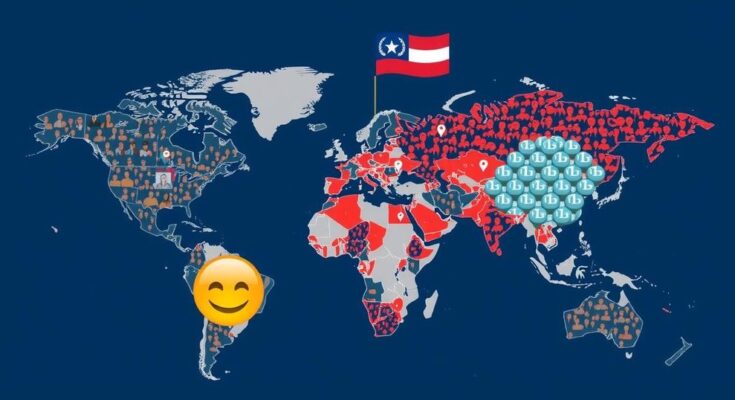Donald Trump’s re-election has elicited mixed reactions from global leaders, who are concerned about potential disruptions to international relations. While some view the victory as an opportunity for strengthened partnerships, particularly in NATO and with allies in Asia, uncertainties regarding trade and security policies persist. The Middle East particularly awaits Trump’s approach to ongoing conflicts. Overall, the global community is preparing for the implications of Trump’s second term.
The recent victory of Donald Trump in the U.S. presidential election has prompted varied reactions from global leaders, reflecting widespread apprehension regarding his potential return to power. Trump won decisively, managing to secure over 270 electoral votes, and declared his intention to prioritize American interests, promising a “golden age” for the country. His prior term was marked by frequent tensions with key allies, and many are concerned about the implications for international relations, trade, and the geopolitical landscape moving forward. Among NATO allies, a sense of unease has emerged. NATO Secretary-General Mark Rutte expressed a desire to work with Trump again but acknowledged the growing alignment of adversarial nations including China, Russia, North Korea, and Iran. Leaders across Europe and beyond have offered congratulations, yet uncertainties linger about how Trump’s protectionist policies will affect global trade, particularly following his previous imposition of tariffs on European products. Responses from European leaders ranged from cautious optimism to outright enthusiasm, as many seek to maintain strategic partnerships despite potential shifts in U.S. policy. UK Prime Minister Keir Starmer referred to Trump’s victory as a historic one, portraying it as an opportunity to safeguard shared democratic values. However, individuals like German Chancellor Olaf Scholz acknowledged the inevitable changes that accompany the Trump administration. In the Middle East, Trump’s return raises questions about his future approach to conflicts involving Israel, Hamas, and Hezbollah. Israeli Prime Minister Benjamin Netanyahu hailed the win as a new beginning, emphasizing the historical alliance between Israel and the United States. As tensions simmer, current crises necessitate careful diplomatic engagement from Washington, particularly concerning ceasefire negotiations. Asia’s leaders, observing the shifting balance of power, are keen on aligning with Trump’s administration for enhanced defense against China’s regional ambitions. Japanese Prime Minister Shigeru Ishiba has indicated a desire for strengthened U.S.-Japan relations, while South Korean President Yoon Suk Yeol has expressed aspirations for an even brighter future under Trump’s leadership. The ramifications of Trump’s second term are still unfolding, with allies grappling with the potential repercussions of an administration characterized by unpredictability and a strong focus on America First policies. As the world watches, only time will reveal the actual outcomes of Trump’s re-election on global stability and international cooperation.
The reactions from global leaders following Donald Trump’s re-election highlight the significant concern regarding international relations in the post-election landscape. Trump’s first term was notorious for its challenges to long-standing alliances, particularly within NATO and other global partnerships. This new term comes amid ongoing crises, especially concerning Ukraine’s defense against Russian aggression, Middle Eastern conflicts, and rising tensions with China. Each region’s leaders are assessing how to engage with the U.S. under Trump’s leadership while grappling with the potential for economic instability and diplomatic challenges.
In conclusion, the global response to Donald Trump’s election win illustrates both apprehension and hope among international leaders. While allies express a desire to maintain cooperative relationships, the uncertainties looming due to Trump’s previous approaches to trade, defense, and diplomacy leave many questions unanswered. The implications of his presidency will likely influence geopolitical dynamics, trade agreements, and international security strategies as world leaders navigate a complex landscape.
Original Source: www.pbs.org




